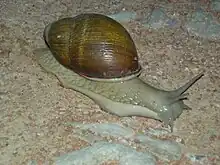| Megalobulimus | |
|---|---|
 | |
| Megalobulimus parafragilior | |
| Scientific classification | |
| Domain: | Eukaryota |
| Kingdom: | Animalia |
| Phylum: | Mollusca |
| Class: | Gastropoda |
| Subclass: | Heterobranchia |
| Order: | Stylommatophora |
| Superfamily: | Rhytidoidea |
| Family: | Strophocheilidae |
| Genus: | Megalobulimus K. Miller, 1878[1] |
| Type species | |
| Bulimus garciamoreni K. Miller, 1878 | |
| Synonyms | |
| |
Megalobulimus is a genus of air-breathing land snail, a terrestrial gastropod mollusk in the subfamily Megalobuliminae within the family Strophocheilidae (according to the taxonomy of the Gastropoda by Bouchet & Rocroi, 2005).[2]
Megalobulimus is the type genus of the subfamily Megalobuliminae.
Species
Species within the genus Megalobulimus include (all species from Brazil are listed):[3]
- Megalobulimus abbreviatus (Bequaert, 1948)
- Megalobulimus albescens (Bequaert, 1948)
- Megalobulimus albus (Bland & Binney, 1872)
- Megalobulimus amandus Simone, 2012[4]
- Megalobulimus arapotiensis Lange-de-Morretes, 1952
- Megalobulimus auritus (Sowerby, 1838)
- Megalobulimus bertae Lange-de-Morretes, 1952
- Megalobulimus bronni (Pfeiffer, 1847)
- Megalobulimus capillaceus (Pfeiffer, 1855)
- Megalobulimus cardosoi (Lange-de-Morretes, 1952)
- Megalobulimus carrikeri (Pilsbry, 1930)
- Megalobulimus castelnaudi (Hupé, 1857)
- Megalobulimus chionostoma (Mörch, 1852)
- Megalobulimus conicus (Bequaert, 1948)
- Megalobulimus crassus (Albers, 1850)
- Megalobulimus dryades Fontenelle, Simone & Cavallari, 2021
- Megalobulimus elongatus (Bequaert, 1948)
- Megalobulimus elsae Falconeri, 1994
- Megalobulimus felipponei Ihering, 1928
- Megalobulimus florezi Borda & Ramírez, 2013
- Megalobulimus foreli (Bequaert, 1948)
- Megalobulimus formicacorsii (Barattini & Ledón, 1949)
- Megalobulimus fragilior (Ihering, 1901)
- Megalobulimus garbeanus (Leme, 1964)
- Megalobulimus globosus (Martens, 1876)
- Megalobulimus grandis (Martens, 1885)
- Megalobulimus granulosus (Rang, 1831)
- Megalobulimus gummatus (Hidalgo, 1870)
- Megalobulimus haemastomus (Scopoli, 1786)
- † Megalobulimus hauthali (Ihering, 1904)
- Megalobulimus hector (Pfeiffer, 1857)
- Megalobulimus helicoides Simone, 2018
- Megalobulimus huascari (Tschudi, 1852)
- Megalobulimus inambarisensis Borda & Ramírez, 2016
- Megalobulimus indigens (Fulton, 1914)
- Megalobulimus intercedens (E. von Martens, 1876)
- Megalobulimus intertextus (Pilsbry, 1895)
- Megalobulimus jaguarunensis Fontenelle, Cavallari & Simone, 2014[5]
- Megalobulimus klappenbachi (Leme, 1964)
- Megalobulimus lacunosus (d'Orbigny, 1835)
- Megalobulimus leonardosi (Lange-de-Morretes, 1952)
- Megalobulimus leucostoma (G. B. Sowerby I, 1835)
- Megalobulimus lichtensteini Albers, 1854
- Megalobulimus lopesi Leme, 1989
- Megalobulimus mauricius Falconeri, 1995
- Megalobulimus maximus (Sowerby, 1825)
- Megalobulimus mogianensis Simone & Leme, 1998
- Megalobulimus musculus (Bequaert, 1948)
- Megalobulimus nodai Lange-de-Morretes, 1952
- Megalobulimus oblongus (Müller, 1774)
- Megalobulimus oliveirai (Bequaert, 1948)
- Megalobulimus oosomus (Pilsbry, 1895)
- Megalobulimus ovatus (Müller, 1774)
- Megalobulimus parafragilior Leme & Indrusiak, 1990
- Megalobulimus paranaguensis (Pilsbry & Ihering, 1900)
- Megalobulimus pergranulatus (Pilsbry, 1901)
- Megalobulimus pintoi Lange-de-Morretes, 1952
- Megalobulimus popelairianus (Nyst, 1845) - synonym: Strophocheilus popelairianus
- Megalobulimus proclivis (Martens, 1888)
- Megalobulimus pygmaeus (Bequaert, 1948)
- Megalobulimus riopretensis Simone & Leme, 1998
- Megalobulimus rolandianus Lange-de-Morretes, 1952
- Megalobulimus sanctipauli (Ihering & Pilsbry, 1900)
- Megalobulimus santacruzii (d'Orbigny, 1835)
- Megalobulimus senezi (Jousseaume, 1884)
- Megalobulimus separabilis (Fulton, 1903)
- Megalobulimus tayacajus Borda & Ramírez, 2016
- Megalobulimus terrestris (Spix, 1827)
- Megalobulimus valenciennesii (Pfeiffer, 1842)
- Megalobulimus versatilis (Fulton, 1905)
- Megalobulimus vestitus (Pilsbry, 1926)
- † Megalobulimus wichmanni Miquel & Manceñido, 1999
- Megalobulimus wohlersi Lange-de-Morretes, 1952
- Megalobulimus yporanganus (Ihering & Pilsbry, 1901)
- Species brought into synonymy
- Megalobulimus bereniceae (Lange-de-Morretes, 1952): synonym of Megalobulimus intertextus (Pilsbry, 1895) (superseded combination)
- Megalobulimus inambarisense [sic]: synonym of Megalobulimus inambarisensis Borda & Ramírez, 2016 (wrong gender agreement of specific epithet)
- Megalobulimus torii Lange-de-Morretes, 1937: synonym of Megalobulimus yporanganus (Ihering & Pilsbry, 1901)
- Megalobulimus valenciennesi (L. Pfeiffer, 1842): synonym of Megalobulimus valenciennesii (L. Pfeiffer, 1842) (incorrect spelling)
Human use
Shells of terrestrial snails, mainly of the genus Megalobulimus, are found in fluvial shellmound (called sambaqui in Brazil) on the Capelinha archaeological site from Paleo-Indian culture of early Holocene.[6]
The shell of Megalobulimus sp. (local name: "churito") is used in the traditional ethnomedicine of Northwest Argentina when babies are hyperactive and cannot sleep well, then it is advised to put a shell under a pillow.[7]
References
- ↑ Miller K. (1878). Malak. Bl. 25: 172.
- ↑ MolluscaBase eds. (2021). MolluscaBase. Megalobulimus K. Miller, 1878. Accessed through: World Register of Marine Species at: http://www.marinespecies.org/aphia.php?p=taxdetails&id=882407 on 2021-07-06
- ↑ (in Portuguese) Norma Campos Salgado & Arnaldo C. dos Santos Coelho. (2003). "Moluscos terrestres do Brasil (Gastrópodes operculados ou não, exclusive Veronicellidae, Milacidae e Limacidae)". Revista de Biología Tropical 51(Suppl. 3): 149-189. PDF Archived October 4, 2011, at the Wayback Machine. (with English abstract)
- ↑ Simone, L. R. L. (2012). "Taxonomical study on a sample of pulmonates from Santa Maria da Vitória, Bahia, Brazil, with description of a new genus and four new species (Mollusca: Orthalicidae and Megalobulimidae)". Papéis Avulsos de Zoologia. 52 (36): 431–439. doi:10.1590/S0031-10492012021600001.
- ↑ Fontenelle, J. H.; Cavallari, D.C.; Simone, L.R.L. "A new species of Megalobulimus (Gastropoda, Strophocheilidae) from Brazilian shell mounds" (PDF). Strombus. 21 (1–2): 30–37. Archived from the original (PDF) on 2015-04-02.
- ↑ Eggers S., Parks M., Grupe G. & Reinhard K. J. (2011). "Paleoamerican Diet, Migration and Morphology in Brazil: Archaeological Complexity of the Earliest Americans". PLoS ONE 6(9): e23962. doi:10.1371/journal.pone.0023962.
- ↑ Hilgert N. I. & Gil G. E. (2007). "Reproductive medicine in northwest Argentina: traditional and institutional systems". Journal of Ethnobiology and Ethnomedicine 3: 19. doi:10.1186/1746-4269-3-19.
Further reading
- Kawano T. & Moreira Leme J. L. (1994). "Chromosomes of three species of Megalobulimus (Gastropoda: Mesurethra: Megalobulimidae) from Brazil". Malacological review 27(1-2): 47-52.
- Borda V., Ramírez R. & Romero P. (2010). "Glándula pediosa de moluscos terrestres y sus implicancias evolutivas, con énfasis en Megalobulimus / Pediose gland in land snails and its evolutionary implications, with emphasis on Megalobulimus." Revista Peruana de Biología 17(1): . 43-52. PDF.
- Rodrigo Salvador, José Fontenelle, Barbara Mizumo Tomotani: Taxonomic reassessment of Megalobulimus toriii (Gastropoda, Strophocheilidae); Journal of Conchology issue 3 vol. 43 p 313-320, 2019.